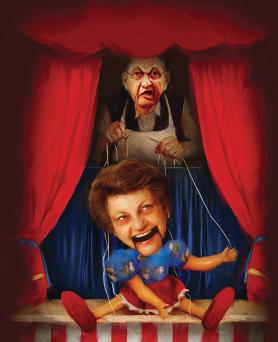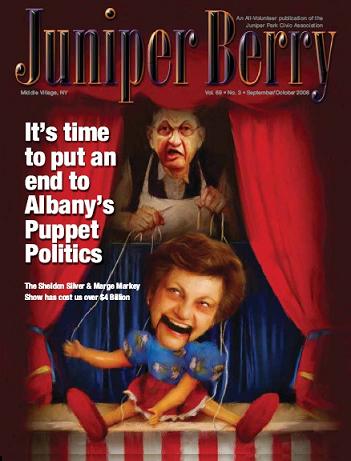Loss to NYC So Far: $4 Billion
May 17 is a particularly sad anniversary in New York City’s fiscal history. The event escapes recent memory, but its effects grow greater as time passes. Return with us now to that chilling day of yesteryear. From out of the past come the thundering hoof beats of the great horse.
Almost 10 years ago, on May 17, 1999, Assembly Speaker Sheldon Silver steamrolled the repeal of the commuter tax through the New York State Assembly. The tax, which was levied at the rate of 45/100 of one percent of the salary of people who did not live in the City of New York but worked here, had brought in over $300 million a year to the City of New York, a sum that would have increased substantially due to inflation and prosperity. The rationale for the tax was that commuters received police, fire, sanitation and other services while they were in the city, and should therefore pay a small share (about 10 percent) of what city residents pay in the city income tax.
The cumulative sum the city has lost due to this one legislative decision is now estimated at $4 billion, and increases by a larger sum each year. The legislature’s vote to repeal the tax moved the city budget further from the structural balance which mayors have sought to attain. In addition, the Legislature has passed numerous pension enhancements and other mandates that the state did not fund, leaving the financial responsibility to the city, which Albany deals with as a large piñata which may be punctured as well.
To be fair, the State Senate and Governor Pataki also supported repeal of the tax. They are upstate Republicans and the commuter tax affects some of them adversely. It is the Democratic majority in the State Assembly that we look to protect the interests of New York City. If the city is unable to secure its fair share of additional state funds, the least the Assembly can do is to see to it that the city is not injured by damaging new legislation aimed at our tax base.
In the spring of 1997, there was a special election for a state senate vacancy in Rockland County, caused by the departure of the Democratic incumbent. The Republican candidate to fill the vacancy came out for repeal of the commuter tax, which is predictable. So did the Democrat. The Republican then challenged the Democrat to get his house, the Assembly, to go along with repeal.
The Speaker swallowed the bait, and pressured New York City Democrats under thumb to support the bill. His deputy, Manhattan Assemblyman and County Leader Denny Farrell, cooperated with Silver, but a number of local Democrats rebelled. The Queens roll calls in each house follow at the end of this article.
It is alleged that Silver’s decision was based in part on personal animus toward Mayor Giuliani, who held the Speaker in ill-concealed contempt. Mayor Giuliani felt that way about a number of people, as did Mayor Koch.
Some, probably most, legislators are honest and decent, within reason. Others take money and favors for their votes, whether through their campaign committee, which is legal, or directly, which is a crime. Pay-for-play behavior is not necessarily legally punishable, but its prevalence is an open sore on government. What is unusual with regard to the repeal of the commuter tax on May 17, 1999, is that the vote was not the result of pressure from lobbyists or contributors, the usual suspects in matters of this sort. The push came from the Speaker’s office, and the obedience of the slavish munchkins who wanted to be or stay on his good side. They voted to repeal the tax despite its enormous cost to the city some of them are supposed to represent.
Revenge for petty slights is a predictable part of politics, and it may not, on occasion, be altogether unjustified. But $4 billion is a terribly high price for the City of New York to have to pay for one man’s nose being put out of joint by one other man, probably unwittingly.
It is an extravagant price even if you throw in the Rockland County senate seat which the Democrats lost anyway, which is what they deserved.
Here are the roll call votes in the Senate and Assembly for Queens members.
Roll Call For Senate
05/17/99 S5594-B Senate Vote Aye: 39 Nay: 16
Queens members: Nay- Daniel Hevesi, Nay- Serphin Maltese, Nay- George Onorato, Nay- Frank Padavan, Aye- Ada Smith, Nay- Toby Stavisky, Nay- Al Waldon.
Roll Call for Assembly
05/17/99 S5594-B Assembly Vote Yes: 92 No : 49
Queens members: No- Jeffrey Aubry, No- Denis Butler, No- Ann Margaret Carrozza, No- Barbara Clark, Yes- Michael Cohen, Yes- Vivian Cook, No- Ivan Lafayette, Yes- Marge Markey, No- Nettie Mayerson, No- Brian McLaughlin, Yes- Cathy Nolan, Yes- Audrey Pheffer, Yes- Pauline Rhodd-Cummings, Yes- William Scarborough, No- Anthony Seminerio, No- Mark Weprin.



